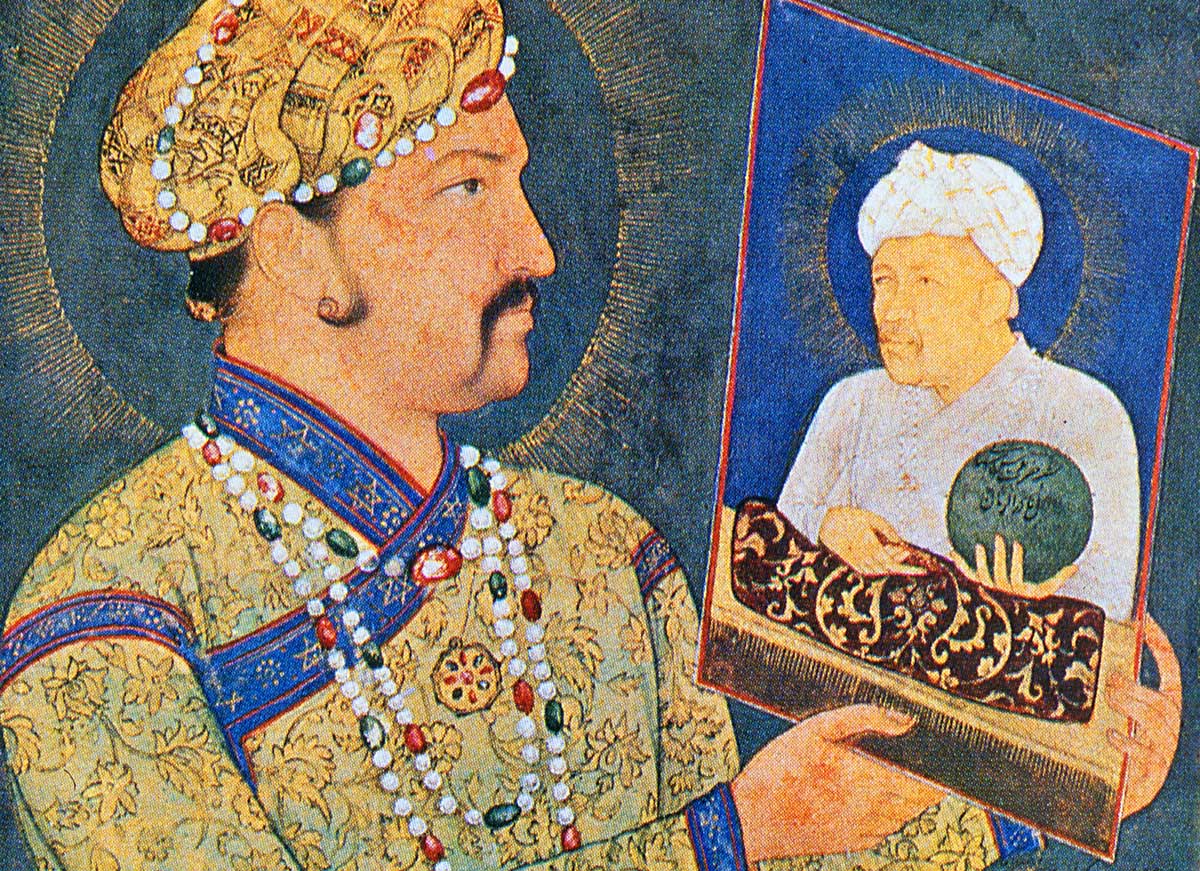cultură şi spiritualitate
The uncertainty, contingency and precarity of England’s incipient commercial and imperial ambitions.
https://www.historytoday.com/archive/review/messy-beginnings

Mughal emperor Jahangir holding a portrait of his father, Akbar the Great, 17th century. Bridgeman Images.
Nandini Das’ captivating new book about Sir Thomas Roe’s embassy to the court of Mughal emperor Jahangir in 1615-19 begins with a map. With its detailed coastlines, unfamiliar landmarks and intriguing blank spaces, it is an apt metaphor both for early modern exploration and for our understanding of the origins of European colonial expansion. As Das reminds us, from the vantage point of the present, knowing only too well what came next, it is tempting to fill in the blanks for ourselves – to join the dots of early colonial experiences and later events to produce a neat narrative that inevitably leads to empire. Courting India steadfastly refuses to do this, treating 17th-century encounters on their own terms and laying before us not the inexorable rise of an imperial power, but the uncertainty, contingency and precarity of England’s incipient commercial and imperial ambitions as they unfolded in all their intrinsic ‘messiness’. The result is a truly impressive work of scholarship and an enthralling read.
The story proper begins in London, with the excitement and expectation that attended the arrival of the new king, James I of England (VI of Scotland), in the capital, and the diplomatic and mercantile aspirations of a reinvigorated nation. The opening chapters provide an overview of the complexities of early Stuart politics and the commercial enterprises and overseas ventures that were shaping English engagements with the world, both within and beyond Europe. They also introduce us to the individual ambitions, networks and experiences of our protagonist, Sir Thomas Roe. Appointed as the king’s ambassador to the Mughal court in late 1614, Roe was charged with negotiating favourable trade treaties and securing English access to the lucrative commercial opportunities, as London merchants belatedly sought a slice of an East India trade largely dominated by the Portuguese. The scene-setting in these early chapters is crucial, both in framing Roe’s own world view and in providing a foil for his later experiences at the Mughal court. Developments ‘at home’ in England, news of which would have reached Roe in India only after many months’ delay, are skilfully inserted into the narrative as the book progresses, providing important context for understanding Roe’s response to the various challenges, opportunities and issues he faced in India, which were at once both alien and recognisable. It is with Roe’s arrival at Jahangir’s court that the book really takes off, however, and we are taken on a richly textured journey into the heart of the Mughal empire.
Courting India is exceptionally well researched, ranging skilfully across a wide range of literary and archival sources, while also being thoughtfully conceptualised in relation to recent developments in the field. It wears its impressive depth of research and intellectual sophistication lightly, however, weaving it deftly into a narrative that is as compelling as it is scholarly. Given the rich visual culture of the Mughal court, the images that might immerse the reader in the world are smaller than I might like – although this is a disappointment born out of wanting more of a good thing rather than any dissatisfaction with what is presented. Roe’s descriptions of Mughal ceremony as ‘theatre’, and the sense of hierarchy and display, for example, are epitomised in Mughal paintings from this period and it is a shame not to see them in their full glory. This minor grumble is quickly forgotten, however, as we become increasingly immersed in the world Roe is trying to navigate, both literally and metaphorically. Roe’s frustrations at various setbacks jump off the page, as do the descriptions of Mughal opulence, of the symbolic importance of gift giving and of the intersections between high politics and personal ambitions. While we see this world primarily through Roe’s eyes, Das avoids any suggestion that it only has meaning through the ‘Western gaze’. The precarity, isolation and relative insignificance of Roe in the Mughal court is constantly foregrounded. Nowhere is this more compellingly demonstrated than in the account of Roe’s first meeting with Jahangir. The culmination of years of careful planning and dangerous travel for Roe, the event did not even merit a passing mention in the emperor’s own diaries.
If Roe’s four-year embassy at Jahangir’s court ultimately proved largely unproductive, in Das’ capable hands the telling of it is anything but. Roe’s experiences are used as a vehicle to explore an early 17th-century world in which the contours of later imperial relationships were not yet set, as changing European understandings of the world came into contact with Mughal (and, to a lesser extent, Ottoman and Safavid) attitudes to it. As such, it is much more than a simple account of a fascinating intercultural encounter between King James I’s ambassador and a Mughal emperor. The intricacies of both Stuart and Mughal politics, the experience of other embassies and other voyages – to Spain, Rome, the Ottoman and Safavid Empires, Guiana – and the intersections between individual ambitions, high politics, courtly rituals and unexpected setbacks are all woven together in a compelling narrative that will appeal to both an academic and a general readership alike. Courting India makes a major contribution to our understanding not just of the origins of empire in India, but of the 17th-century world.
Courting India: England, Mughal India and the Origins of Empire
Nandini Das
Bloomsbury 480pp £30
Buy from bookshop.org (affiliate link)
Andrea Major is Professor of Colonial History at the University of Leeds.
Adaugă un comentariu
© 2024 Created by altmarius.
Oferit de
![]()
Embleme | Raportare eroare | Termeni de utilizare a serviciilor













Pentru a putea adăuga comentarii trebuie să fii membru al altmarius !
Alătură-te reţelei altmarius